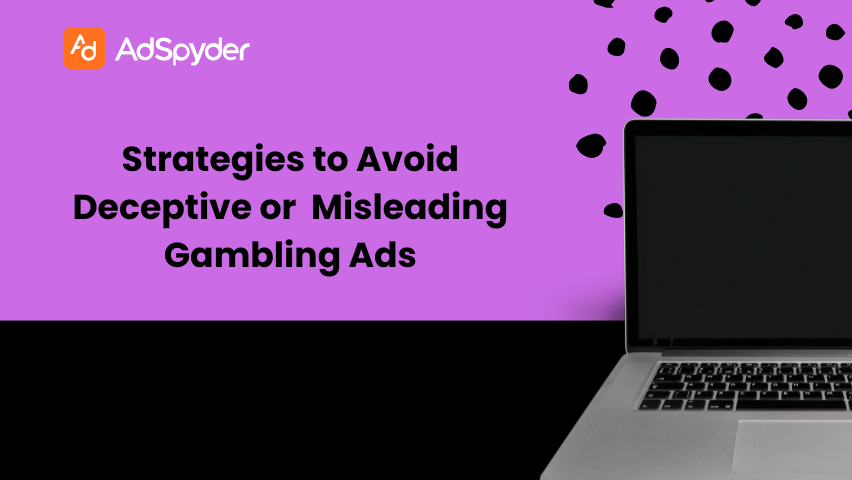In the fiercely competitive realm of gambling advertising, operators are in a constant battle for the attention of potential bettors. While crafting creative and captivating advertisements is essential for engaging audiences, advertisers must prioritize honesty and transparency to combat misleading gambling ads and address issues like ad fraud in betting and ad fraud in gambling. Deceptive or misleading advertising can inflict substantial harm on the gambling industry, eroding user trust and tarnishing brand reputation. In this comprehensive guide, we will explore strategies that advertisers can employ to steer clear of deceptive practices, uphold the principles of truth in advertising, and build unwavering credibility with their audience while ensuring ad transparency in betting and misleading game ads are minimized.
Ready to Elevate your Marketing Strategy?
Adhering to Truth in Advertising
One of the foundational tenets of ethical advertising is the unwavering commitment to ensuring that all claims and offers within advertisements are accurate and truthful.
- Exaggerated claims or false promises can mislead users and lead to disillusionment.
- Advertisers must remain steadfast in providing genuine information about their gambling services and promotions, thereby reducing the risk of gambling misdemeanors and misleading game ads.
- Not only does this uphold the brand’s integrity, but it also fosters a positive perception among consumers.Studies reveal that an overwhelming 77% of consumers believe that honesty and truthfulness in ads are essential.
- Deceptive advertising erodes trust and credibility among potential customers, resulting in diminished customer loyalty and negative brand associations.
- Honesty in advertising lays the foundation for long-term relationships with users, encouraging repeat business and generating word-of-mouth referrals.
- Explore our insights in the article on the impact of video marketing in online gambling advertising.
While discussing effective strategies to prevent deceptive or misleading gambling ads, it’s essential to recognize the impact of ad blockers on the advertising landscape. To learn more about how ad blockers are affecting online advertising practices and how advertisers can adapt, explore our insights in the article on the Impact of Ad Blocking in online gambling advertising.
Reviewing and Approving Ad Content
To maintain the integrity of their advertising campaigns, operators should institute stringent review processes to validate ad content before publication, thus reducing the likelihood of gambling misdemeanors and misleading game ads.
- Involving legal and compliance teams in the ad approval process can help ensure that all advertising materials comply with industry regulations and legal requirements.
- Additionally, conducting comprehensive reviews can help identify potential risks associated with deceptive claims and misleading information. This addresses concerns related to ad fraud in betting.
Statistics gleaned from the Advertising Standards Authority (ASA) reveal that complaints related to misleading advertising in the UK gambling sector surged by an alarming 145% in recent years. A rigorous review process can serve as a bulwark against such complaints and potential legal ramifications, thereby safeguarding the reputation of the operator and, by extension, the industry as a whole.
Check it out: LinkedIn Advertising Masterclass: 8 Essential Metrics for Campaign Success
Transparency in Odds and Payouts
Clear and transparent information concerning odds and payouts is paramount in gambling advertising to combat misleading gambling ads.
- Users must be empowered to make informed decisions, and advertisers must display accurate odds and payout information in their ads. Providing lucid explanations of how odds are calculated can further enhance transparency.
- A survey commissioned by the UK Gambling Commission underscores the importance of transparent and clear odds information. A resounding 81% of respondents considers it essential in gambling advertisements.
- Users are more likely to place their trust in operators that furnish comprehensive odds details, as transparency engenders a sense of fairness and integrity.
- By displaying accurate odds and payout information, advertisers demonstrate their commitment to responsible gambling practices. This also helps to prioritize customer satisfaction.
Transparent odds information assists users in gauging their potential winnings and making informed betting choices.
Independent Verification and Validation
To bolster the credibility of their advertising claims and statistics, gambling operators should seek third-party verification and validation. This helps in combating misleading gambling ads.
- Utilizing credible sources and data to substantiate ad messages can lend legitimacy to the claims made in advertisements.
- Research conducted by Nielsen affirms that a striking 83% of consumers place greater trust in advertising claims supported by data.
- Independent validation bolsters the reliability of advertising claims. It provides users with the assurance that the presented information is both accurate and trustworthy.
- Through partnerships with reputable auditing firms or collaboration with independent industry organizations, gambling operators can secure validation for their promotional claims.
This collaboration not only underscores a commitment to transparency but also highlights responsible advertising practices.
Check it Out: Google Ads For Dropshipping | Tips to Increase Your Sales for 2024
Conclusion
In the fiercely competitive domain of gambling advertising, preserving trust and credibility stands as the ultimate imperative. By unwaveringly adhering to truth in advertising, implementing robust ad content review processes, providing transparent odds and payout information, and actively seeking independent verification, operators can successfully combat misleading gambling ads and foster unwavering trust among their target audience.
This additionally consists of addressing advert fraud in betting and ad fraud in gambling whilst the usage of gear like Google Ads to enhance campaign efficiency. Mastering ad metrics can also enhance average performance and duty in gambling advertising and marketing.
Ethical advertising serves as the guardian of the gambling industry’s reputation and solidifies the relationship between operators and users. This is based on principles of honesty and transparency, while minimizing misleading game ads. This also includes addressing ad fraud in betting and ad fraud in gambling.
Check it out: LinkedIn Ad Campaigns 2024: Best Examples and Insights
FAQs
Misleading gambling ads are advertisements that contain false or deceptive information, potentially leading users to make uninformed decisions. They are problematic as they erode trust and harm the reputation of both advertisers and the industry.
Advertisers can prioritize truth in advertising by providing accurate and honest information, conducting thorough reviews, displaying transparent odds and payouts, and seeking independent validation of their claims.
Transparency in odds and payouts empowers users to make informed betting decisions. It builds trust by providing clear information, enhancing the perception of fairness and integrity in the advertising.
Independent verification and validation lend credibility to advertising claims by relying on third-party sources and data. This practice enhances the trustworthiness of advertisements and reassures users that the information presented is accurate.
Deceptive gambling advertising can lead to legal and regulatory issues, damage to brand reputation, loss of user trust, and potential fines or penalties for non-compliance.
Gambling operators can establish partnerships or seek certification from recognized industry organizations. These specialize in validating advertising claims and ensuring compliance with industry standards.



